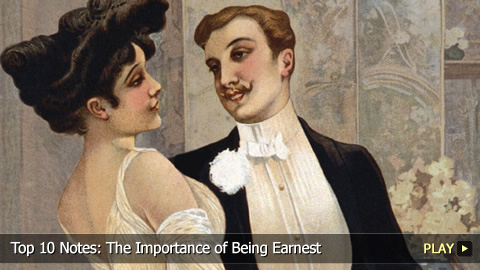Top 10 Notes: The Importance of Being Earnest

This play’s full title is “The Importance of Being Earnest, A Trivial Comedy for Serious People.” Welcome to WatchMojo.com and in this installment of Mojo Notes, we’ll be exploring ten things you should knows about Oliver Wilde’s “The Importance of Being Earnest.”
#10 – About the Author
Born in Dublin, Ireland in 1854, Oscar Wilde was exposed to the worlds of medicine and culture by his successful parents. While studying the classics and reading the Greats during college, he joined artistic and literary movements. He became known for his writing, especially his poems, plays and sole novel during the late 19th century. After being imprisoned for his lifestyle choices, Wilde succumbed to illness in 1900.
#9 – Influences and Inspirations
Wilde was already at the peak of his success when he wrote this play. Featuring elements of farce through its exaggerated and unlikely situations, this comedy of manners also parodied social classes in a witty and intellectual way.
#8 – Settings and Era
Written in Worthing, England in 1894, “The Importance of Being Earnest” is set in the urban city vibe of London and the more natural country atmosphere of Hertfordshire during the mid-1890s. However, those settings aren’tmeant to contrast each other: Wilde actually uses both locations to mock late Victorian high society and its social customs.
#7 – Plot
Though this play is not told through the eyes or voice of a narrator, the plot revolves around two friends named John and Algernon who attempt to avoid their social obligations by pretending to be a made-up person named Ernest. In love with a woman named Gwendolen, John-as-Ernest proposes to her but the marriage is forbidden due to his low birth. Algernon-as-Ernest then proposes to the heiress named Cecily whom Jack is legally bound to protect. After several confusing and hilarious situations, the truth is revealed: the two men are actually brothers and John’s birth name is Ernest. This means the two couples can be together at last.
#6 – John Worthing
John, or Jack when he’s in the country, drives the play’s action along with help from his fellow protagonist, Algernon. As such, these well-educated and well-off men are quite similar: they’re trying to get wives, and they have butlers and imaginary friends. Both work hard to secure their engagements, despite Lady Bracknell’s judgment, and both descend on the country – essentially in disguise – to deal with the problem of brother Ernest. They also arrange for christenings they think’ll bring the happy ending of marriage. However, Jack differs from Algy because he’s more serious about keeping up his air of respectability. He also acts like a protective older sibling, but gets angry when things don’t go his way.
#5 – Algernon Moncrieff
Algernon is Jack’s vain and impulsive best friend. He takes few things seriously and is more interested in having fun. He demonstrates this by taking on the persona of Ernest to charm Cecily into falling in love with him.
#4 – Gwendolen Fairfax and Cecily
Though Gwendolen and Cecily have diaries and want to marry a man named Ernest, these two ladies also have their share of differences. While Gwendolen is bossy and believes she’s more cultured due to her city upbringing, Cecily is clever, simple and innocent. Despite being a country girl, Cecily also demonstrates she can hold her own against Gwendolen. This is especially important later on considering they will be sisters-in-law.
#3 – Values and Themes
The play discusses how lying to get out of one’s duties can quickly get out of control and how truth and honesty ultimately win out. It also explores how reputation and social class affect relationships as well as the significance of love and marriage. Though foolishness can bring humor to our lives, it’s also important to know when to be sincere and earnest. In this way, Wilde is making light of the obsessions and faults of the Victorian upper class.
#2 – Modern Popularity
With its tight plot and a climax that unfolds near the end, “The Importance of Being Earnest” is considered a well-made play. And thanks its humor and dialogue, it’s considered one of Wilde’s finest literary achievements.
#1 – Adaptations
The play’s popularity has influenced people to adapt it for the radio, the opera and television. When it comes to big screen versions, the 1952 film has been praised for its closeness to the play and its acting. Fifty years later, movie audiences were entertained by the Oliver Parker-directed adaptation starring Reese Witherspoon, Colin Firth and more.
What’s your favorite piece of “The Importance of Being Earnest” trivia? For more informative top 10s published every day, be sure to subscribe to WatchMojo.com.

